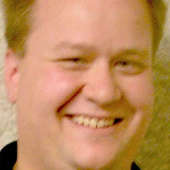- Gorgeous visuals, charming characters fill Disney's 'Big Hero 6' (11/13/14)
- 'Fury' covers the same ground as other war movies (11/6/14)
- Murray finds his career-best role in 'St. Vincent' (10/31/14)
- My 'Odd' goodbye to working on the McCook stage (10/24/14)
- My 'Odd' goodbye to working on the McCook stage (10/23/14)
- Fall TV coverage: FOX aiming to keep their cool points (10/2/14)
- Fall TV coverage: CBS pins fall hopes on procedurals, NFL (9/25/14)
Opinion
A lively portrait of an American legend
Thursday, November 29, 2012
From an early point in an American's education, you learn about Abraham Lincoln. You hear about his rural upbringing, how he was practically self-taught by firelight. You see images that burn in your memory: his gaunt, lanky figure, stove-pipe hat atop his unruly mop of hair. You read his words, not only what he wrote, but the things he said, whether in the throes of a debate with his Illinois political rival Stephen Douglas or one of his momentous speeches during the Civil War, particularly the Gettysburg Address. Most Americans are aware of the impact that the 16th President of the United States had on our country. He was a man who has been (and continues to be) spoken of with awe and reverence, and always in hushed tones.
Steven Spielberg's "Lincoln" feels momentous, precisely because it goes the other way -- it is the most vibrant and well-rounded vision of the man, not the legend, yet put to film. (And yes, I'm including the awful fantasy of "Abraham Lincoln, Vampire Hunter" in that mix.) It deigns to show you a Lincoln (portrayed by Daniel Day-Lewis) you may not know that well (as textbooks tend to build and bolster the image of "Saint Abe"), a man who used others' perceptions of him as a hayseed and yarnspinner to distract his opponents -- and even allies -- from his keen legal mind and political skill. The Lincoln depicted here was not above getting his hands dirty when he felt he had just cause, and his actions made him more than a few enemies, even in the Union.
I mentioned earlier that "Lincoln" is vibrant -- indeed, the movie's dialogue crackles in even its quietest, most intimate conversations -- and that's in no small part to the fact that the film is surprisingly funny, too. The advertising would have you believe that this is a solemn, serious film (and it certainly has those moments), but there are also more genuine laughs in this movie than in any number of "comedies" in current release.
Credit for the film's liveliness belongs in a number of corners: Spielberg's direction is as good as it's been in a number of years, the script by Tony Kushner (based in part on the fascinating "Team of Rivals" by historian Doris Kearns Goodwin) is crisp and intelligent, and Janusz Kaminski's use of light, shadows and darkness in his cinematography brings the reality of mid-19th century America to life for modern audiences.
Then there are the actors. Day-Lewis is marvelous in the title role; his is likely to be considered the definitive version of Abraham Lincoln for decades to come. But he's not alone in delivering a top-notch performance -- Sally Field gives as good as she gets as a brittle, but never-to-be-underestimated Mrs. Lincoln; Tommy Lee Jones steals scene after scene as Thaddeus Stevens; David Strathairn is terrific as Lincoln's partner in political gamesmanship, William Seward; and James Spader is hilariously oily as W.N. Bilbo, one of three operatives brought into play by Seward and Lincoln.
"Lincoln" is an excellently-produced and intelligent film; that isn't a surprise. What's surprising is that it's also such a richly entertaining and completely rewarding experience, one that illustrates the power of great filmmakers working at their peak of their abilities. Four stars (out of four).
Content advisory: "Lincoln" is rated PG-13 for an intense scene of war violence, some images of carnage and brief strong language. (There are also some racial epithets uttered during the course of the film.) The violence isn't overly bloody, but is accurately depicted in its brutality; hand-to-hand combat along the front lines during the Civil War was anything but civil.

